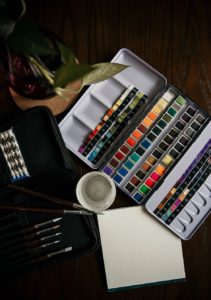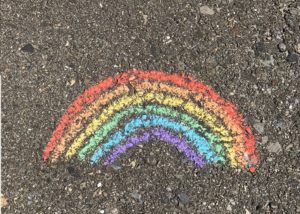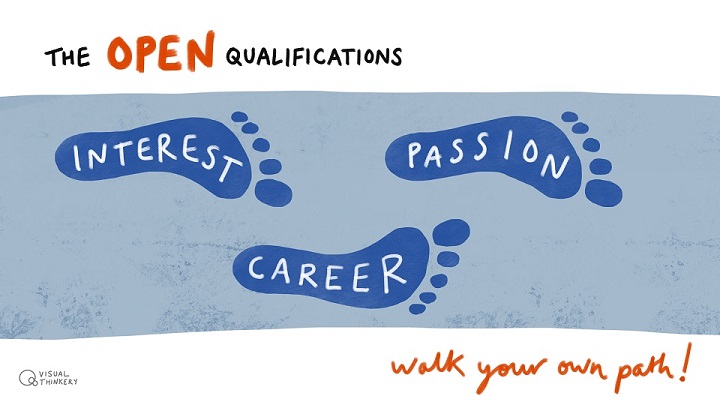 Jay Rixon is a Senior Manager in Access, Open and Cross-curricular Innovation and responsible for the MA or MSc Open qualification. In this post, Jay reflects on a staff-student online drop-in session held on Tuesday 14th March 2020.
Jay Rixon is a Senior Manager in Access, Open and Cross-curricular Innovation and responsible for the MA or MSc Open qualification. In this post, Jay reflects on a staff-student online drop-in session held on Tuesday 14th March 2020.
In this rather strange and surreal season there is a clear need to be looking after our mental health as much as looking after our physical health. Words like wellbeing and mindfulness spring to mind – those terms seemed to have been coined in the last few years whereas the habit of sewing, knitting, embroidering, painting, baking and just plain old tinkering have been around for centuries, although for some of those years they might have been considered more of an everyday need rather than a pastime.
To use the word hobbies seems to degrade these pastimes which occupy our hands and calm our minds. They give us purposeful activity and a sense of accomplishment when something is produced, be it a great looking (and tasting) cake, an item of clothing, a decoration or an upcycled piece of furniture, made for yourself or for a family member or a friend. Due to this current season we find ourselves in, the role of a hobby or a pastime has a greater value than we might have previously thought.

The student and staff online drop-in session explored how our hobbies and pastimes positively impact our mental health and at this time provide us outlets to support anxiety levels. They help us to wile away hours here and there, or through the use of creative endeavours they provide the means to help us show our appreciation of others.
The gathered group in this drop-in session during this time have been exploring the following hobbies or pastimes:
| Embroidery | Sewing | Board Games |
| Card-making | Knitting | Painting |
| Cooking/baking | Photography | Jigsaws |
We spoke about the use of photos, what pictures we take and how we share them. With so many of us having powerful cameras on our smartphones in our pockets, we now take more photos than ever. A few people shared that previously they had taken part in ‘posting a photo a day’ on sites like https://www.blipfoto.com/ and that habit of taking a photo to share in that curated space helped them be more thoughtful and creative with their pictures.
The OU Student Association has a Photography Club which in August will be two years old. This club virtually brings people together to share a passion for photography across all levels with challenges and an opportunity to share snapshots of key moments. A few people mentioned wanting to do more with their photos from this period: photos that show a new appreciation for a flower, a tree in blossom or a piece of meaningful artwork feels worth saving somehow and being something to remember and hold on to.
Others shared about initiatives and creative challenges that have sprung up like the Community Stitch Challenge which offers a way for passionate embroiderers to connect with others in the community and to take part in a shared stitch experience. Inspirational challenges are set, alongside videos and instructional handouts.
The notion of a shared textile community is something that is happening in my neighbourhood. A local arts centre has asked for separate panels to be made which will then be stitched together (hopefully someday soon!) to make a SewnTogetherQuilt. That quilt will be a display of the community: the makers who used their material scraps, their sewing skills and their creativity to produce a tangible output and something reflective of this season.
Playing Boardgames online was also a recommended pastime – not quite the fun of being down the pub with a few friends, but for now a good replacement. Activities that can be done physically or virtually were talked about, like jigsaws, with many people saying how they had dusted off old jigsaws, but others saying online versions were just as good, with no chances for there to be missing pieces. Others recommended apps where you can paint by numbers or colour in, without the need for paints or brushes.
There was some discussion about the pros and cons of the use of electronic media versus the physical tactile sensation of sorting through a jigsaw box or mixing up a bespoke colour on your artist’s palette. The less time we spend on electronic devices, the better with many of us glued to screens or similar devices to continue our work in a home environment. That point led the discussion onto why we turn to these activities, and why in our day-to-day lives they help us, and how they especially help us at this time.

A recent publication of ‘In the Moment’ magazine mentioned how, “creative practice naturally lends itself to mindfulness, meditation and the state of ‘flow’, whereby we can be absorbed in a task that is challenging enough to require complete concentration, but not so challenging that we’re discouraged.” The sense of achievement when you see something you have accomplished was promoted by the group. The same magazine article commented that “studies have shown that engaging in a creative activity for just 45 minutes can lower levels of the stress hormone cortisol.”
We also discussed the rise of social media comments about people who might like to use this time to get fitter, look better and learn a new language and that pressures like that at this time were unhelpful as not everyone has additional time on their hands. It is about using the time that we have in a way that will support our own individual circumstances.
We spoke of the amazing and touching ways that art is being used at this time, with the numerous artworks of rainbows being displayed in windows across the country, created in many different ways, using a number of different materials but all meaning the same thing, and wholeheartedly showing our appreciation at this time for the key workers on the front line.

The Charity Mind have supported this with their Crafternoons. On Friday 10th April a Zoom call was held where the notion of community and crafting was facilitated by online technology.
We also spoke of the amazing opportunities to engage with arts such as live streams of Shakespeare plays from The Globe, plays from The National Theatre and musicals, thank to Andrew Lloyd Webber and the Show Must Go On. These are events that we might not usually get to engage with, and these events provide structure and something to look forward to.
We spoke about the future, sharing some of the new activities and pastimes we might be looking forward to exploring when we can. However, in the meantime, we recognise the value of the hobbies and pastimes we currently have, that our enjoyment comes not in the final accomplishment but in the act of doing them. Picasso said, “the purpose of art is washing the dust of daily life off our souls”. Personally speaking, at this time I’m so grateful to have hobbies or pastimes I can disappear into for a bit,. Whereas before I might have felt a little apologetic for my list of hobbies, now I treasure them for the great benefits I receive from them each day, never more so than now.
